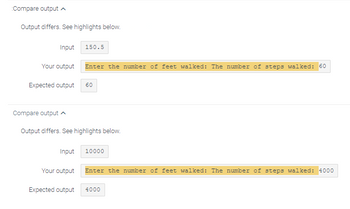A pedometer treats walking 1 step as walking 2.5 feet. Define a function named FeetToSteps that takes a double as a parameter, representing the number of feet walked, and returns an integer that represents the number of steps walked. Then, write a main program that reads the number of feet walked as an input, calls function FeetToSteps() with the input as an argument, and outputs the number of steps. Use floating-point arithmetic to perform the conversion. Ex: If the input is: 150.5 the output is: 60
A pedometer treats walking 1 step as walking 2.5 feet. Define a function named FeetToSteps that takes a double as a parameter, representing the number of feet walked, and returns an integer that represents the number of steps walked. Then, write a main program that reads the number of feet walked as an input, calls function FeetToSteps() with the input as an argument, and outputs the number of steps. Use floating-point arithmetic to perform the conversion. Ex: If the input is: 150.5 the output is: 60
Database System Concepts
7th Edition
ISBN:9780078022159
Author:Abraham Silberschatz Professor, Henry F. Korth, S. Sudarshan
Publisher:Abraham Silberschatz Professor, Henry F. Korth, S. Sudarshan
Chapter1: Introduction
Section: Chapter Questions
Problem 1PE
Related questions
Question
Please use C++ for answer

Transcribed Image Text:A pedometer treats walking 1 step as walking 2.5 feet. Define a function named FeetToSteps that takes a double as a parameter,
representing the number of feet walked, and returns an integer that represents the number of steps walked. Then, write a main program
that reads the number of feet walked as an input, calls function Feet ToSteps() with the input as an argument, and outputs the number of
steps.
Use floating-point arithmetic to perform the conversion.
Ex: If the input is:
150.5
the output is:
60
The program must define and call a function:
int FeetToSteps (double userFeet)

Transcribed Image Text:1 #include <iostream>
2 #include <iomanip>
3 using namespace std;
4
5 /* Define your function here */
6
7 int main() {
8
9
10
11}
12
/* Type your code here */
return 0;
Expert Solution
This question has been solved!
Explore an expertly crafted, step-by-step solution for a thorough understanding of key concepts.
This is a popular solution!
Trending now
This is a popular solution!
Step by step
Solved in 4 steps with 2 images

Follow-up Questions
Read through expert solutions to related follow-up questions below.
Follow-up Question
Still incorrect. Please view the errors highlighted in YELLOW and fix them please.

Transcribed Image Text:Compare output
Output differs. See highlights below.
Input 150.5
Your output
Expected output
Compare output ^
Enter the number of feet walked: The number of steps walked: 60
Output differs. See highlights below.
Your output
60
Input 10000
Expected output
Enter the number of feet walked: The number of steps walked: 4000
4000
Solution
Knowledge Booster
Learn more about
Need a deep-dive on the concept behind this application? Look no further. Learn more about this topic, computer-science and related others by exploring similar questions and additional content below.Recommended textbooks for you

Database System Concepts
Computer Science
ISBN:
9780078022159
Author:
Abraham Silberschatz Professor, Henry F. Korth, S. Sudarshan
Publisher:
McGraw-Hill Education

Starting Out with Python (4th Edition)
Computer Science
ISBN:
9780134444321
Author:
Tony Gaddis
Publisher:
PEARSON

Digital Fundamentals (11th Edition)
Computer Science
ISBN:
9780132737968
Author:
Thomas L. Floyd
Publisher:
PEARSON

Database System Concepts
Computer Science
ISBN:
9780078022159
Author:
Abraham Silberschatz Professor, Henry F. Korth, S. Sudarshan
Publisher:
McGraw-Hill Education

Starting Out with Python (4th Edition)
Computer Science
ISBN:
9780134444321
Author:
Tony Gaddis
Publisher:
PEARSON

Digital Fundamentals (11th Edition)
Computer Science
ISBN:
9780132737968
Author:
Thomas L. Floyd
Publisher:
PEARSON

C How to Program (8th Edition)
Computer Science
ISBN:
9780133976892
Author:
Paul J. Deitel, Harvey Deitel
Publisher:
PEARSON

Database Systems: Design, Implementation, & Manag…
Computer Science
ISBN:
9781337627900
Author:
Carlos Coronel, Steven Morris
Publisher:
Cengage Learning

Programmable Logic Controllers
Computer Science
ISBN:
9780073373843
Author:
Frank D. Petruzella
Publisher:
McGraw-Hill Education